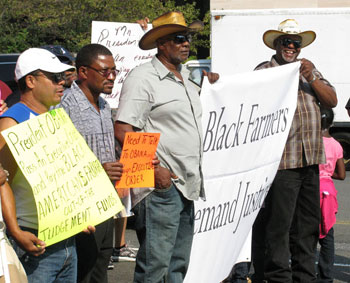

Vol. 74/No. 46 December 6, 2010

|
| Militant/Nick Gruenberg |
| Black farmers and supporters at September 23 action in Washington, D.C., protesting government discrimination. Holding banner are farmers Lester Bonner, left, and John Bonner, right. |
“We have got to be prepared that the war isn’t over,” said farmer Lester Bonner a day after the Senate decision. “After all these years and all the things that have been done to us, we’ve learned to expect just about anything. The USDA even started taking part of my wife Rosa’s monthly Social Security payments to repay a loan I cosigned with my father back in 1997.”
Bonner filed for Chapter 13 bankruptcy several years ago as a way to stop these and other threatened moves by the USDA against him.
Lester Bonner, 63, and his brother John, 65, raise hogs and produce hay on their 113-acre farm here. Along with other Black farmers in the area, they have been fighting for years to keep their land and continue farming. They discussed their ongoing struggle at a community pig roast held at their farm November 20.
“We shouldn’t have to go through the extremes we’ve been through, over and over again, just to get by,” said John Bonner.
In 1987 the Bonners, who began farming as sharecroppers working with their father, were finally able to buy back land that their family had owned in 1893 and later lost.
The Black farmers’ case began in 1997 when hundreds of farmers filed a class-action lawsuit against the USDA for racist discrimination in loans and other farm programs. The case, known as Pigford v. Glickman, resulted in a consent decree in 1999. That settlement promised Black farmers a $50,000 payment, as well as loan forgiveness, tax breaks, and priority consideration for future loans.
However, farmers had to provide “substantial evidence” of discrimination. Of the original 22,547 claims filed, 41 percent were denied. An additional 75,000 claims were also denied, on the basis that they were filed after a September 2000 deadline. A total of about $1 billion was disbursed.
Farmers have been fighting since then to extend compensation to those farmers left out and to force the USDA to end its ongoing pattern of discrimination. In 2010 alone, there have been numerous protests by Black farmers in the South and in Washington, D.C., letting the federal government know they were not going to stop fighting.
An additional $100 million was allocated in the 2008 Farm Bill to compensate the farmers. In May 2010 the House of Representatives approved $1.15 billion more to pay farmers denied compensation for filing past the deadline. Now that this has passed in the Senate, the bill has to return to the U.S. House and then be signed into law by President Barack Obama. Gary Grant, president of the Black Farmers and Agriculturalists Association (BFAA), issued a press release November 22. BFAA “cautions against drawing the conclusion that this matter is resolved,” the release said.
“Further, BFAA has strong reservations about the use of surplus funding from the WIC [Women, Infants, Children food assistance program] to help offset the total package. How in the world, we wonder, can WIC have a nearly $570 million surplus in these times? If folks who need food assistance have been bureaucratically removed from the rolls to create a surplus, we are outraged and others should be as well.”
The Senate measure also allocated $3.4 billion to settle another longstanding discrimination case by 300,000 Native Americans against the federal government for swindling them out of royalty payments for natural resources mined on tribal lands.
The Black farmers’ determination to stand up to racist treatment at the hands of the government has inspired other farmers. In October, Native American farmers reached a separate settlement with the USDA over discrimination claims. Latino farmers and women farmers are also fighting USDA discrimination.
Front page (for this issue) |
Home |
Text-version home